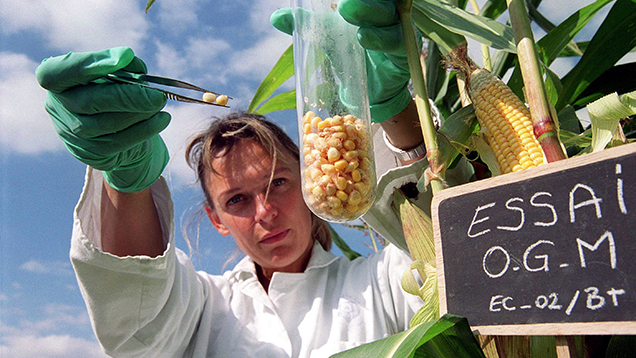Scotland’s GM crops ban provokes letter row
 © Sipa Press/Rex Shutterstock
© Sipa Press/Rex Shutterstock An open letter signed by 30 scientists and other specialists has been sent to Scottish rural affairs minister Richard Lochhead in support of the announced Scottish ban on GM crops.
The letter, sent to the minister on 2 September, urges Scotland to become a leader in the science of agroecology, which the signatories say has been proven to be an efficient and sustainable way of farming that produces healthy soils, plants, animals and food.
Carlo Leifert, professor of ecological agriculture at Newcastle University, who signed the letter, said: “I strongly believe that the Scottish government is right in banning genetically modified crops.
See also: Scotland to ban farmers from growing GM crops
“The process of safety testing is still a completely flawed process and there are potentially significant public health risks and negative biodiversity and environmental impacts, while there is likely to be no commercial benefit for farmers from the currently available GM crops.
“On the other hand, there are likely to be significant commercial benefits from Scotland being clearly recognised as a GM-free region for producers of major Scottish export crops/crop products (for example potato, cereals, oilseed rape, soft fruit, whisky).”
Last month, Mr Lochhead said Scotland would opt out of allowing farmers to grow EU-authorised GM crops if new laws were passed to let individual member states decide to ban or allow the technology.
The Scottish government’s decision to impose a formal ban on GM crops north of the border has split opinion in the science community.
An open letter opposing the Scottish GM ban [PDF] had been sent on 17 August to Mr Lochhead, signed on behalf of 28 universities institutes, academic organisations and other institutions.
That letter, co-signed by the NFU, the Roslin Institute, the European Academies Science Advisory Council and the Royal Society of Edinburgh, called for an urgent meeting with the minister on GMs.
It warned that banning GM crops in Scotland could restrict the country to ageing agricultural practices and “risks constraining Scotland’s contribution to research and leaving Scotland without access to agricultural innovations which are making farming more sustainable elsewhere in the world”.
It highlighted research that might benefit Scotland’s farmers, consumers and environment, including potatoes that can reduce fungicide use and omega-3 enriched oilseeds that could provide a more sustainable source of feed for salmon farming.
“There are many other needs for the development of disease-resistant, pest-resistant and climate resilient crops, where a GM method has a contribution to make,” it added.
On Thursday (2 September), MEPs on the European Parliament’s agriculture committee in Brussels voted against plans to allow individual member states to make their own choices on GM crops.
The committee’s opinion – adopted by 28 votes in favour to eight against, with six abstentions – will now be scrutinised by the environment committee, which has the lead on this file, before the European Parliament as a whole votes on the matter.
The UK government has indicated it would be in favour of allowing farmers in England the flexibility to grow GM crops, but Scotland, Germany, France, Italy, Latvia and Greece are among the countries that have said they would enforce a ban.

